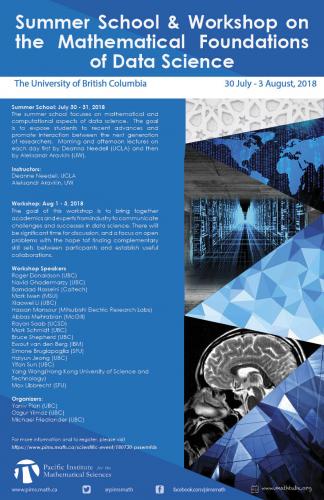PIMS Summer School and Workshop on the Mathematical Foundations of Data Science
Speakers
Details
There are fundamental open questions that limit the industrial uptake of ideas from the mathematics of high-dimensional data and their application in practice. These include bridging the gap between the sampling required by theory and what is efficient in practice; translating the theory from analogue to digital; developing algorithms that scale gracefully to big data applications; and implementation of open-source software, which serves as an effective means of technology transfer. A downloadable poster is available below.
Summer School: July 30-31, 2018
The summer school focuses on mathematical and computational aspects of data science. The goal is to expose students to recent advances and promote interaction between the next generation of researchers. Morning and afternoon lectures on each day first by Deanna Needell (UCLA) and then by Aleksandr Aravkin (UW).
July 30: Deanna Needell, UCLA
Morning lecture: Simple Classification from Binary Data
Binary, or one-bit, representations of data arise naturally in many applications, and are appealing in both hardware implementations and algorithm design. In this talk, we provide a brief background to sparsity and 1-bit measurements, and then present new results on the problem of data classification from binary data that proposes a framework with low computation and resource costs. We illustrate the utility of the proposed approach through stylized and realistic numerical experiments, provide a theoretical analysis for a simple case, and discuss future directions. This will be a 1-hour lecture followed by a 1-hour discussion and problem session.
Afternoon lecture: Iterative projective approach for highly corrupted linear systems
We consider solving large-scale systems of linear equations that are inconsistent. We propose a hybrid approach utilizing ideas from the randomized Kaczmarz method and those put forth by Agmon, Motzkin et al. that exhibits a faster initial convergence rate without sacrificing solution accuracy. We show that significant improvements in the convergence rate are possible when the residual vector has a high dynamic range, as is the case when the system has been corrupted by a small number of large errors in b. With this as our motivating example, we further develop an approach for this setting that allows detection of the corrupted entries and thus convergence to the true solution of the original uncorrupted system. We provide analytical justification for our approaches as well as experimental evidence on real and synthetic systems. This will be a 1-hour lecture followed by a 1-hour discussion and problem session.
July 31: Aleksandr Aravkin, UW
Morning and Afternoon Lectures: Efficient Optimization for Data Science.
Optimization algorithms play a key role in many areas of data science. We will look at some of these problems, focusing on the interplay between problem structure and algorithm design. We'll start with convex formulations and consider basic first-order and primal-dual methods. Next, we will see some how nonconvex problem formulations arise in data science, looking at compressive sensing and robust learning formulations, and learn simple algorithms to solve such problems. We will end with some fun algorithm design ideas that use basic concepts in new ways, for both convex and nonconvex problems. The lectures will be accompanied by hands-on activities.
Workshop: August 1-3, 2018
The goal of this workshop is to bring together academics and experts from industry to communicate challenges and successes in data science. We plan to have significant time for discussion, and a focus on open problems with the hope that we can find complementary skill sets between us and establish useful collaborations. On the academic side, we are interested in establishing theoretical foundations for data science problems.
Confrimed Workshop Speakers:
Aleksandr Aravkin (UWashington) - recent addition
Aaron Berk (UBC) - recent addition
Ewout van den Berg (IBM)
Simone Brugiapaglia (SFU)
Navid Ghadermarzy (UBC)
Bamdad Hosseini (Caltech)
Mark Iwen (MSU)
Xiaowei Li (UBC)
Max Libbrecht (SFU)
Brian Macdonald (GreaterThanPlusMinus, LLC)
Hassan Mansour (Mitsubishi Electric Research Labs (MERL))
Abbas Mehrabian (McGill)
Rayan Saab (UCSD)
Mark Schmidt (UBC)
Bruce Shepherd (UBC)
Halyun Jeong (UBC)
Yifan Sun (UBC)
Click here for the Program Schedule
This event is part of the PIMS CRG on High Dimensional Analysis.
Additional Information
Location:
University of British Columbia, Vancouver.
Leonard S. Link Building, Room 460
Registration fee:
Registration closes July 25 at 4:00pm
Early registration fee: Until July 13th, 2018
$30 Summer School only
$35 Workshop only
$60 Summer School and Workshop
Late registration fee: After July 13th, 2018
$35 Summer School only
$40 Workshop only
$70 Summer School and Workshop
Registration is a two step system. You will need to create and account with PIMS and then return to this webpage, click the SIGNUP button and make the payment below.
Summer school and workshop speakers do not need to register below.
Travel to UBC:
Please see here for more directions.
Accommodation on campus:
Participants can book rooms through any of the following on-campus housing options (based on availability).
UBC Conferences and Accommodation


